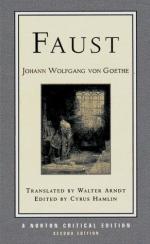|
This section contains 7,160 words (approx. 24 pages at 300 words per page) |

|
SOURCE: Lamport, F. J. “Goethe's Faust: A Cautionary Tale?” Forum for Modern Language Studies 35, no. 2 (April 1999): 193-206.
In the following essay, Lamport investigates the role of guilt and redemption in Faust.
Goethe's Faust being what it is, the life's work of Germany's greatest poet, and German literary criticism being what it is, intimately bound up with the catastrophic “Sonderweg” of German history over the past two centuries, it was inevitable that Faust criticism should have become highly politicised. The history of Faustian interpretation has indeed been, as Hans Schwerte called it, “ein Kapitel deutscher Ideologie”;1 indeed not one but several, and more are being added all the time. In particular, interpretations of the so-called “perfectibilist” school have been repeatedly appropriated to serve the ideological purposes of a succession of aggressive and/or authoritarian political regimes, from the Bismarckian Second Empire of 1871 through the National Socialist Third Reich of...
|
This section contains 7,160 words (approx. 24 pages at 300 words per page) |

|


